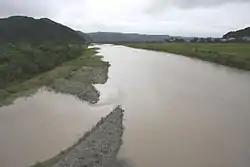Saru River
Saru River (沙流川, Saru-gawa) is a river in Hokkaidō, Japan.
| Saru River 沙流川 | |
|---|---|
 | |
| Native name | Saru-gawa |
| Location | |
| Country | Japan |
| State | Hokkaidō |
| Region | Hidaka Subprefecture |
| District | Saru District |
| Municipalities | Biratori, Hidaka |
| Physical characteristics | |
| Source | Mount Kumami |
| • location | Hidaka, Hidaka Subprefecture, Japan |
| • coordinates | 42°58′59″N 142°45′8″E |
| • elevation | 930 m (3,050 ft) |
| Mouth | Pacific Ocean |
• location | Hidaka, Hidaka Subprefecture, Japan |
• coordinates | 42°30′5″N 142°0′31″E |
• elevation | 0 m (0 ft) |
| Length | 104 km (65 mi) |
| Basin size | 1,350 km2 (520 sq mi) |
| [1][2][3] | |
The Saru River rises in the Hidaka Mountains and empties into the Pacific. It is considered sacred in traditional Ainu beliefs.[4]
The Nibutani Dam is situated on the Saru River, at Nibutani village. The construction of this dam was the subject of famous domestic litigation, producing the first ever Japanese legal decision to recognise the Ainu people as an indigenous people. Construction of a second dam, the Biratori Dam is also planned by the Hokkaido Development Board.[5] The 'Cultural Landscape along the Saru River resulting from Ainu Tradition and Modern Settlement' has been designated an Important Cultural Landscape.[6]
See also
References
| Wikimedia Commons has media related to Saru River. |
- 沙流川 (in Japanese). Ministry of Land,Infrastructure and Transport Hokkaido Regional Development Bureau. Retrieved 2008-09-29.
- 鵡川 25000:1 (in Japanese). Geographical Survey Institute. Retrieved 2008-09-29.
- 沙流岳 25000:1 (in Japanese). Geographical Survey Institute. Retrieved 2008-09-29.
- Lam, May-Ying (July 27, 2017). "'Land of the Human Beings': The world of the Ainu, little-known indigenous people of Japan". The Washington Post. Archived from the original on July 28, 2017.
Some recounted stories of modern-day discrimination. Others spoke of the lost beauty of the Saru River, a sacred site for the Ainu, on which the government constructed a dam in the 1990s.
- Large, Tim (2001-01-01). "FEATURE - Sacred river doubly dammed by pork-barrel Japan". Planet ARK. Reuters. Retrieved 2009-05-19.
- "Database of Registered National Cultural Properties". Agency for Cultural Affairs. Retrieved 29 April 2011.
This article is issued from Wikipedia. The text is licensed under Creative Commons - Attribution - Sharealike. Additional terms may apply for the media files.